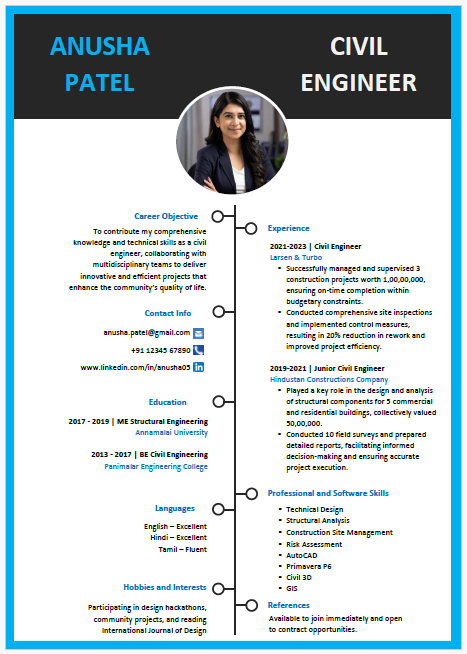Civil Engineer
ME Structural Engineering

About this template
This is a well-designed resume template which can help you stand out from the competition and showcase your qualifications in a clear, professional manner.
This is a very colorful and modern resume which can help you stand out from the competition. Its vibrant design and well-organized layout effectively showcase your skills and achievements, making a lasting impression on potential employers.
Some important and useful technical skills for well experienced civil engineer
A well-experienced civil engineer requires a diverse set of technical skills to design, plan, and oversee construction projects effectively. Here are ten important and useful technical skills for a seasoned civil engineer:
1. Structural Analysis and Design:
Proficiency in structural analysis and design is crucial for ensuring the safety and stability of buildings, bridges, and other infrastructure. Experienced civil engineers use software like SAP2000, ETABS, and STAAD.Pro to analyze loads and stresses, and to design structures that can withstand various forces.
2. Geotechnical Engineering:
Knowledge of geotechnical engineering is essential for understanding soil behavior and its impact on construction projects. Civil engineers must assess soil properties, conduct site investigations, and design foundations that are safe and cost-effective.
3. Construction Management:
Expertise in construction management involves planning, coordinating, and overseeing construction activities. Civil engineers use tools like Microsoft Project and Primavera P6 to manage schedules, budgets, and resources, ensuring projects are completed on time and within budget.
4. Hydraulic and Hydrology Engineering:
Understanding hydraulic and hydrology engineering is vital for designing water-related infrastructure, such as dams, drainage systems, and water supply networks. Civil engineers apply principles of fluid mechanics and water flow to prevent flooding and manage water resources efficiently.
5. Transportation Engineering:
Proficiency in transportation engineering is important for designing and maintaining roads, highways, railways, and airports. Civil engineers analyze traffic patterns, design road layouts, and implement safety measures to enhance transportation systems.
6. Environmental Engineering:
Environmental engineering skills are crucial for sustainable construction practices. Civil engineers must assess environmental impacts, design systems for waste management and pollution control, and comply with environmental regulations to protect natural resources.
7. Computer-Aided Design (CAD):
Expertise in CAD software, such as AutoCAD and Civil 3D, is essential for creating detailed engineering drawings and plans. CAD tools allow civil engineers to visualize projects, make precise measurements, and modify designs efficiently.
8. Building Information Modeling (BIM):
Knowledge of BIM is increasingly important for integrated project delivery. Civil engineers use BIM software like Revit and Navisworks to create digital representations of physical and functional characteristics of structures, facilitating collaboration among stakeholders.
9. Material Science:
A deep understanding of material science helps civil engineers select appropriate construction materials, such as concrete, steel, and asphalt. This skill is essential for ensuring the durability, safety, and cost-effectiveness of construction projects.
10. Surveying and Geographic Information Systems (GIS):
Surveying and GIS skills are critical for mapping and analyzing land features. Civil engineers use these tools to gather accurate data for site planning, boundary determination, and infrastructure layout, ensuring precise execution of construction projects.
Conclusion:
These technical skills enable experienced civil engineers to design, manage, and oversee a wide range of construction projects, ensuring they are safe, efficient, and environmentally friendly. Mastery of these areas positions civil engineers to lead successful projects and contribute significantly to the built environment.